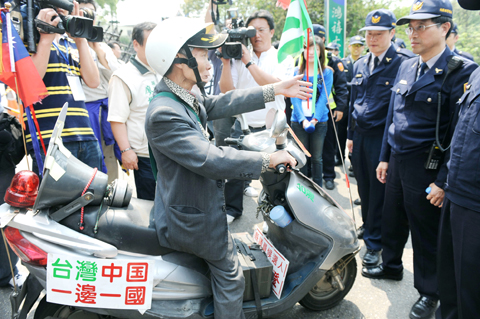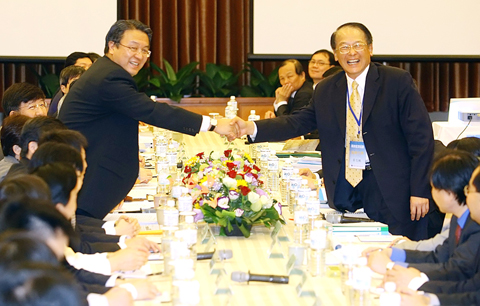The second round of negotiations on a proposed economic cooperation framework agreement (ECFA) with China opened yesterday in Dasi (大溪), Taoyuan County, amid scuffles between police and protesters who accused the government of attempting to sell out Taiwan.
The first of the two-day negotiations yesterday focused on the “early harvest” items proposed for traded goods and services, as well as regulations on the labeling of product origin and the text of the proposed ECFA.
The “early harvest” list refers to a list of goods and services that will be subject to immediate tariff concessions or exemptions, which are expected to form the backbone of the proposed deal.

PHOTO: LO PEI-DER, TAIPEI TIMES
Bureau of Foreign Trade Director-General Huang Chih-peng (黃志鵬), the head of the Taiwanese delegation, said negotiations on the text were almost done, and the two sides would continue discussions on the early harvest items and product origin labels today.
“The two sides exchanged ideas and had deep discussions on the impact of an ECFA on industries on both sides. Our stances are getting closer, and we will continue the negotiations with sincerity and flexibility,” he said in a press briefing after a full-day of negotiation at Ta Shee Resort in Dasi.
Huang said the Taiwanese delegation reiterated its stance on limiting imports of Chinese agricultural products and not opening the market to Chinese workers.

PHOTO: CNA
Taiwan also stressed that it would not consider including traditional industries on the early harvest list and would protect the interests of small and medium businesses, he said.
Machinery, textiles, petrochemicals, as well as automobiles and related components, are expected to be on Taiwan's early harvest list. The two sides also discussed service businesses that could be included in the list.
Huang declined to comment whether the Taiwanese delegation made any compromises on the list during the negotiations. He said the delegation requested that China consider the difference in the scope of the markets and industries on both sides when negotiating items.
Straits Exchange Foundation (SEF) Vice Chairman Kao Koong-liang (高孔廉) said later yesterday during a dinner banquet for the Chinese delegation that Taiwan would make sure that traditional industries would not be affected after the ECFA is signed.
Tang Wei (唐煒), head of the Department of Taiwan, Hong Kong and Macau under China's Ministry of Commerce, said the two sides would seek to reach consensus on the early harvest list based on the principle of “fast, easy and less” — dealing with easy issues before contentious ones, and limiting the scope of the early harvest list so that a consensus can be reached soon.
“[An] ECFA is neither a panacea nor a curse ... We will put the interests of the general public and local business into consideration in negotiating an ECFA,” he said.
Promoting the benefits of an ECFA, Tang said 271 free-trade agreements had been signed around the world but no country had been marginalized as a result of these pacts.
Early yesterday morning, about 100 protesters arrived from nearby towns and cities to protest outside the venue of the meeting, saying the controversial agreement would pave the way for eventual unification with China.
Hundreds of police officers — some in full riot gear — set up barricades and closed down roads, turning the quaint countryside resort into what some protesters likened to “a military camp.”
Several rounds of clashes later took place as protesters attempted to break through the barbed wired barricades and police guarding entry into the resort.
The protesters dispersed at noon following repeated warnings by police, but gathered again early in the afternoon, yelling slogans and burning Chinese flags.
“President Ma Ying-jeou (馬英九) and the ECFA are selling Taiwan out,” “Taiwan and China are two different countries” and “ECFA needs a nationwide referendum,” the crowd chanted.
The clashes were the latest in a long string of headaches for the government which has expressed optimism that it can complete negotiations on the agreement before the end of June.
The timing and location of yesterday's talks were heavily criticized by the opposition after the government only announced the venue on Monday — two days before the start of the negotiations.
DPP legislators said the remote location was chosen to limit the amount of protesters at the scene, while other said the Ma government was downgrading Taiwan's status by deciding not to hold the meeting in Taipei.
The two sides held the first round of negotiations in January in Beijing.
Kao said the SEF chose to hold the event outside Taipei “purely because we could not find enough rooms for delegation members in the city,” as the timing of the negotiations was not determined until several days ago.
Although, no serious injuries were reported at press time, several protest organizers later alleged there had been instancesof police brutality. A group of Taoyuan County DPP councilors said they were hit by police officers during the morning scuffles.
DPP headquarters, however, rejected reports that it was involved in the protests, saying it did not have plans to launch protests over the trade agreement.
“It's too early to talk about protests. The DPP will discuss such actions pending the outcome of the government's attitude on holding an ECFA debate and nationwide referendum,” DPP Chairperson Tsai Ing-wen (蔡英文) said.
The DPP has accused the Ma administration of ignoring public opinion after the government rebuffed its earlier calls to hold a referendum on the proposed pact. A recent poll conducted by the DPP showed that 45.8 percent of respondents were against signing the proposal, while 34.9 percent supported it.
Critics oppose the ECFA amid fears that it would jeopardize Taiwan's sovereignty and make it too economically dependent on China.
Both the DPP and the Taiwan Solidarity Union have been pushing for a referendum on the issue.
Sources from the DPP said that Presidential Office Secretary-General Liao Liou-yi (廖了以) would meet DPP Secretary-General Su Jia-chyuan (蘇嘉全) at an undisclosed location today to hammer out details on the upcoming talks between Ma and Tsai.
The DPP has called for a “debate” on the proposed ECFA, but the Presidential Office said it would prefer a “discussion” of the issue.

A magnitude 7.0 earthquake struck off Yilan at 11:05pm yesterday, the Central Weather Administration (CWA) said. The epicenter was located at sea, about 32.3km east of Yilan County Hall, at a depth of 72.8km, CWA data showed There were no immediate reports of damage. The intensity of the quake, which gauges the actual effect of a seismic event, measured 4 in Yilan County area on Taiwan’s seven-tier intensity scale, the data showed. It measured 4 in other parts of eastern, northern and central Taiwan as well as Tainan, and 3 in Kaohsiung and Pingtung County, and 2 in Lienchiang and Penghu counties and 1

FOREIGN INTERFERENCE: Beijing would likely intensify public opinion warfare in next year’s local elections to prevent Lai from getting re-elected, the ‘Yomiuri Shimbun’ said Internal documents from a Chinese artificial intelligence (AI) company indicated that China has been using the technology to intervene in foreign elections, including propaganda targeting Taiwan’s local elections next year and presidential elections in 2028, a Japanese newspaper reported yesterday. The Institute of National Security of Vanderbilt University obtained nearly 400 pages of documents from GoLaxy, a company with ties to the Chinese government, and found evidence that it had apparently deployed sophisticated, AI-driven propaganda campaigns in Hong Kong and Taiwan to shape public opinion, the Yomiuri Shimbun reported. GoLaxy provides insights, situation analysis and public opinion-shaping technology by conducting network surveillance

‘POLITICAL GAME’: DPP lawmakers said the motion would not meet the legislative threshold needed, and accused the KMT and the TPP of trivializing the Constitution The Legislative Yuan yesterday approved a motion to initiate impeachment proceedings against President William Lai (賴清德), saying he had undermined Taiwan’s constitutional order and democracy. The motion was approved 61-50 by lawmakers from the main opposition Chinese Nationalist Party (KMT) and the smaller Taiwan People’s Party (TPP), who together hold a legislative majority. Under the motion, a roll call vote for impeachment would be held on May 19 next year, after various hearings are held and Lai is given the chance to defend himself. The move came after Lai on Monday last week did not promulgate an amendment passed by the legislature that

AFTERMATH: The Taipei City Government said it received 39 minor incident reports including gas leaks, water leaks and outages, and a damaged traffic signal A magnitude 7.0 earthquake struck off Taiwan’s northeastern coast late on Saturday, producing only two major aftershocks as of yesterday noon, the Central Weather Administration (CWA) said. The limited aftershocks contrast with last year’s major earthquake in Hualien County, as Saturday’s earthquake occurred at a greater depth in a subduction zone. Saturday’s earthquake struck at 11:05pm, with its hypocenter about 32.3km east of Yilan County Hall, at a depth of 72.8km. Shaking was felt in 17 administrative regions north of Tainan and in eastern Taiwan, reaching intensity level 4 on Taiwan’s seven-tier seismic scale, the CWA said. In Hualien, the